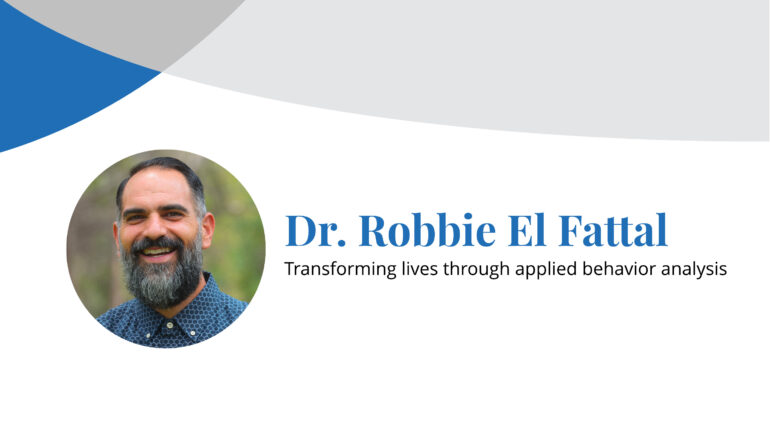With three businesses, five children, and three academic degrees, Robbie El Fattal, Ph.D., knows how to work hard. Now he’s working to ensure that his impact on the field of applied behavior analysis (ABA) continues.
Dr. El Fattal, a 2020 graduate of the Ph.D. Behavior Analysis program at The Chicago School, has been working in applied behavior analysis for more than 20 years. He began his career through teaching, coaching, and program development before stepping into entrepreneurship as the founder of three different organizations for children with autism.
Dr. El Fattal credits The Chicago School with helping him improve his critical thinking and leadership skills. “The start of my career taught me to be critical and embrace rigor and opportunity with the right mindset,” Dr. El Fattal says. “When The Chicago School came around, I was ready. The program was informative to my work and made me a better executive and people-leader and opened up new opportunities for me.”
Dr. El Fattal grew interested in working with children with autism after volunteering in high school. Despite the emergence of the field of behavior analysis at the time, there was a lack of providers. After high school, he started working with Autism Partnership, a leading provider of autism therapy services, starting as a behavior tech in the classroom.
By the time Dr. El Fattal worked up to overseeing the Autism Society of America (ASA) program (after earning his BCBA, master’s degree, and teaching credentials) he realized he wanted to impact children more directly. Dr. El Fattal and his wife, Katie, started their first company, Patterns Behavioral Services, to provide ABA therapy to individuals with autism while focusing on clinical excellence.
“By 2015, we had 120 patients and more than 100 staff members,” Dr. El Fattal says. “The differentiator for us was our clinical training. We had incredible training and mentorship for so many years and brought that same level of excellence to our practice.”
At that point, Dr. El Fattal and his family moved from California to Austin, Texas, to start a second company, Cultivate Behavioral Health & Education. “Within two or three years, we had gone from opening our first center to having multiple centers,” Dr. El Fattal says. “It gave us an opportunity to combine what we learned from our time in California with our clinical excellence.”
Another reason for the family’s move to Texas was Dr. El Fattal’s desire to apply to graduate programs. While he didn’t start his graduate studies at The Chicago School, he continued them there because of the flexibility and executive-level focus of its program. That allowed him to balance his schoolwork, his leadership responsibilities at Cultivate, and his family duties.
Dr. El Fattal speaks highly of how The Chicago School challenged him to further his thinking and leadership. He recalls working with his dissertation chair Amanda Mahoney, Ph.D. on his thesis and how she pushed him to find the root of a problem, something he still does today.
“When you’re an executive and you get ideas, you don’t always have an open mind. You have a team, so you can execute it,” Dr. El Fattal says. “I remember talking to Dr. Mahoney about this. I wanted to do my project on performance management. She kept encouraging me to focus on finding the greater context, to go back and consider: Where does behavior management fit into this larger paradigm? Now when I have a problem, I try to find the root and understand the context. Much of that academic rigor has helped me as an executive to be more creative and a better problem-solver.”
After graduating from The Chicago School, he founded his third company, Maraca Learning. Maraca is a clinician-led organization engaging the most skillful talent in the ABA field. Dr. El Fattal says the main difference between his current and past work is that now he’s focused on the dissemination of research and training, and the intersection between the two.
While he has shifted from being hands-on work with children to focusing on building systems and empowering clinicians, he is proud to help current and future clinicians achieve the best outcomes.
“My job more than ever is to build systems that help clinicians do their job and to empower them to be their best selves,” Dr. El Fattal says. “I get to coach the team and build an environment for them to flourish.”

